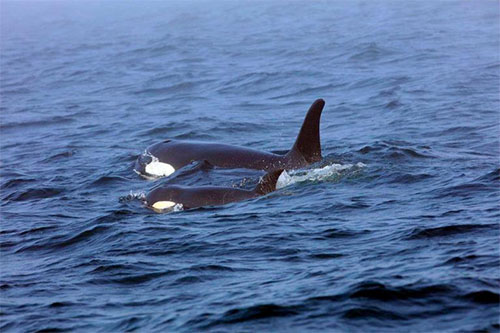— from NOAA Fisheries —

Biologists are mobilized and responding to an emaciated and ailing three year-old killer whale (born December 2014), J50 also known as Scarlet, of the critically endangered Southern Resident population. J50 appears lethargic at times with periods of activity, including feeding. Scientists observing her agree that she is in poor condition and may not survive. Responders from NOAA Fisheries and partner organizations are exploring options ranging from no intervention to providing medical treatment, potentially delivered in a live Chinook salmon, which has never before been attempted in the wild. Potential treatment may include medication and nutrition.
J35, an adult female also known as Tahlequah, who carried her dead calf for over two weeks, is also being monitored.
J50 / Scarlet Updates
August 17: Test results from the health samples collected from J50/Scarlet are starting to come in from several top laboratories around the country. A fecal sample collected last weekend from a group of three J Pod whales (J16/Slick, J42/Echo, and J50/Scarlet), showed high levels of Contracaecum, a nematode parasite that is commonly found in killer whales and other marine mammals. The worm is not usually a problem in healthy animals. However, in animals that are emaciated or are otherwise compromised, the parasite can penetrate the stomach lining, introducing bacterial infection to the bloodstream, or it can bore into internal organs. While we cannot be sure the sample came from J50/Scarlet, the veterinary team has updated her treatment priorities to include antibiotics and a dewormer. Both have proven successful and safe in other cetaceans. The treatment should help J50/Scarlet by reducing bacterial and parasitic burdens on her system so she can start regaining the weight she has lost. The whales remain in open waters off the west side of Vancouver Island, beyond the reach of the response teams.
August 14: Now that the response team has met its initial goals for J50 / Scarlet’s health assessment and treatment, and J Pod has headed out to open waters, biologists and veterinarians are taking stock of what they have learned so far. They are reviewing video footage and photos and processing samples to gain further insights into her health and behavior. Teams continue to monitor the whales and collect fecal and prey samples (e.g., fish scales) when possible. They will also review the results of Sunday’s (8/12) feeding trial while they determine next steps.
**If you are reading theOrcasonian for free, thank your fellow islanders. If you would like to support theOrcasonian CLICK HERE to set your modestly-priced, voluntary subscription. Otherwise, no worries; we’re happy to share with you.**







